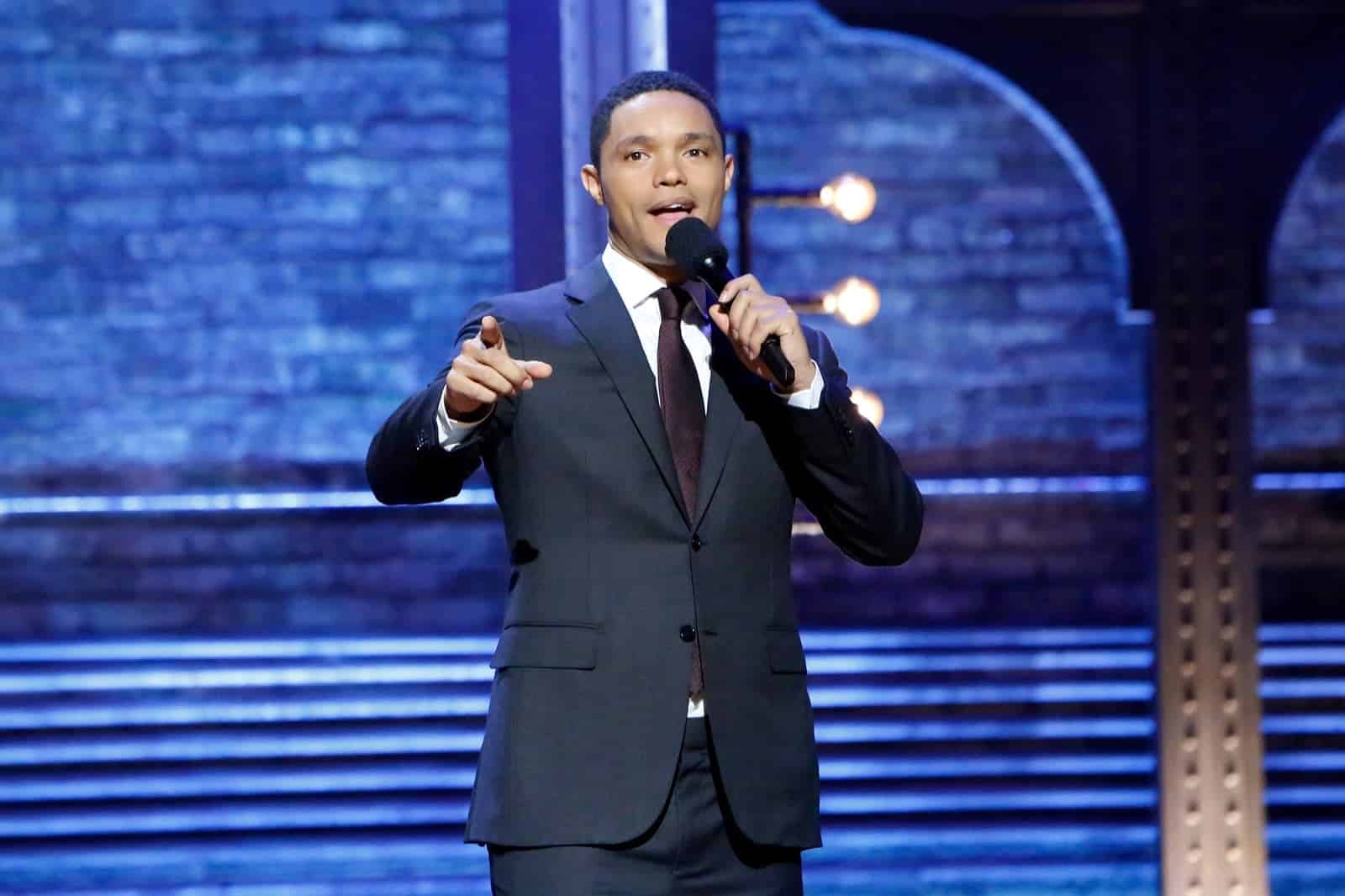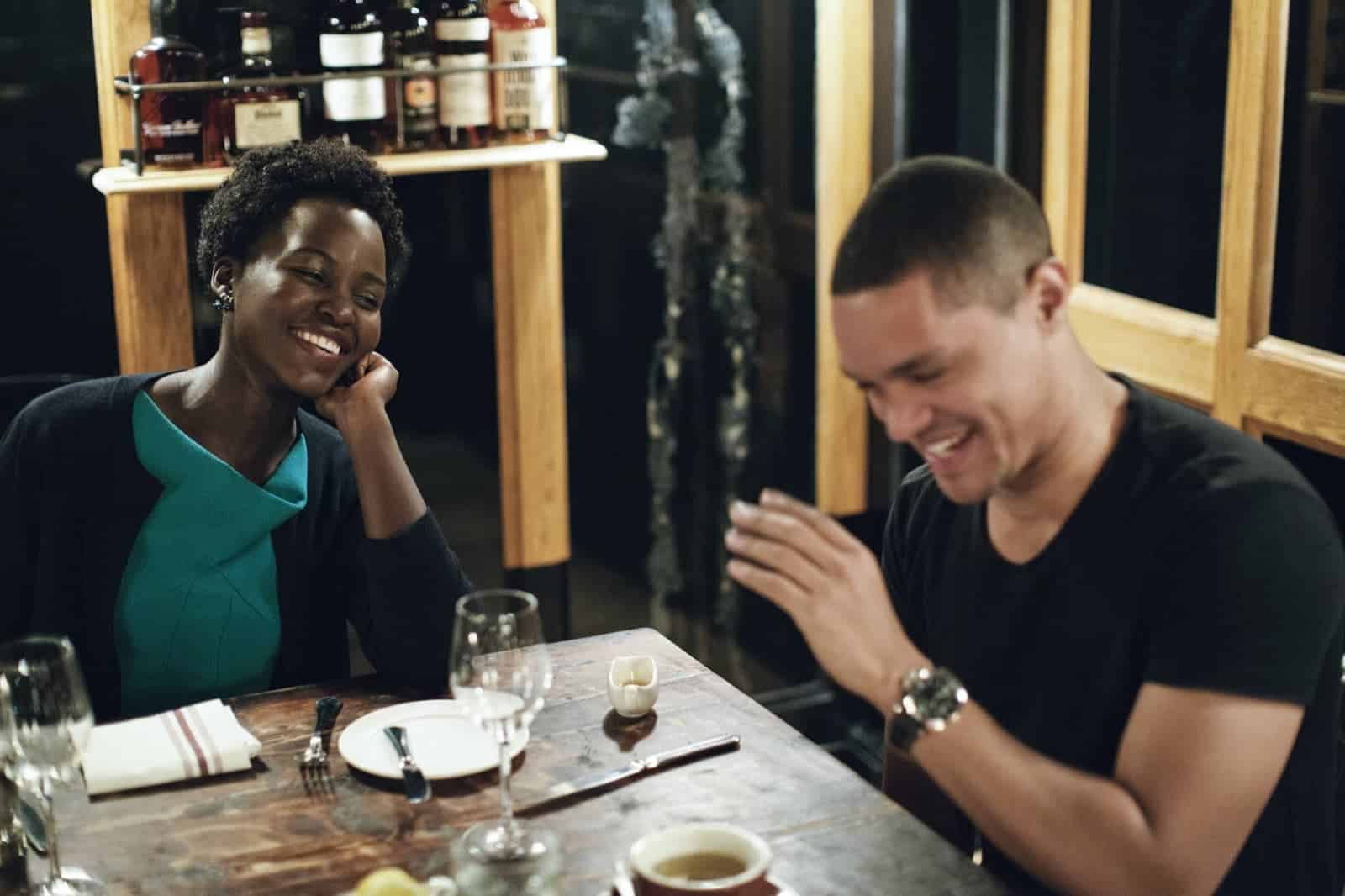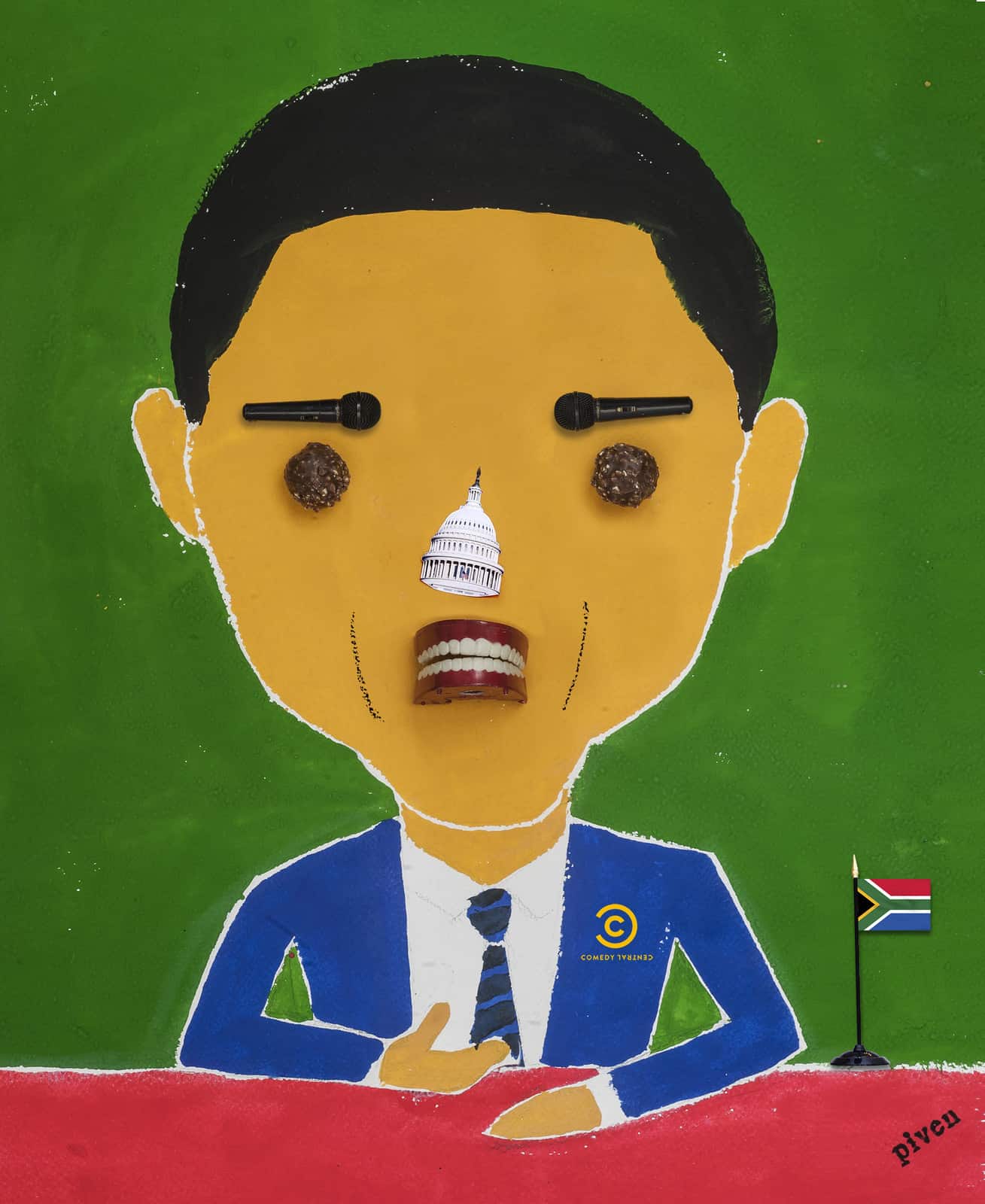ILLUSTRATION BY HANOCH PIVEN
Trevor Noah found an excuse to be quiet, finally. After bookending an appearance at the 2018 Global Citizen Festival in Johannesburg with 36 hours’ worth of flights, the comedian was given a diagnosis—a polyp on his vocal cords—as well as an ultimatum: have surgery or lose the voice. He had the procedure and for the next three weeks said nary a word, but that didn’t stop the hyper-charismatic 35-year-old from hosting The Daily Show: He never missed an episode, instead working silently, miming to his news team, which sounded off on his behalf.These episodes offer an example of how Noah has, since succeeding Jon Stewart in The Daily Show’s main chair in 2015, made an art out of turning the circumstances of our times into something cheerful, cheeky, gently defiant, and always a bit weird. Following Stewart seemed an impossible task, but Noah has connected with the show’s audience, in part by sharing rivers of content on social media—on Twitter, his personal account and the show’s official one combine for more than 17 million followers—and the South Africa–born comedian has managed to transcend the show with a bevy of smashing successes. He’s done two Netflix stand-up specials and is currently in the midst of a 29-date North American tour, Loud & Clear. His 2016 memoir, Born a Crime: Stories from a South African Childhood, was a fixture on the New York Times best-seller list for months.
That memoir, of course, explains Noah’s gravitas. He was born mixed-race in Apartheid-era South Africa, and his mother, Patricia, survived being shot in the head by an abusive husband. It’s a tale of struggle and survival that is now a part of some U.S. high school curriculums, and next month a new young readers version will be released by Delacorte. Plus, a film adaptation is on the way, with Oscar winner Lupita Nyong’o slated to play Noah’s mother. The film’s release date hasn’t been announced, but one thing’s for certain: It gives Noah one more chance to let someone else do the talking—if only for a moment.
I understand you’re going back and forth between The Daily Show and your tour dates for Loud & Clear these days. Where are you right now?
I’m in New York City, and then I’m heading out to North Carolina, Virginia, and Florida this weekend, so it’s jam-packed—a really good time.
What’s the biggest difference between telling jokes to a studio audience as opposed to a live one?
That’s an interesting one. With a studio audience, the context is different. They haven’t necessarily gotten themselves in the same mind-set as a stand-up crowd. It’s not generally an evening out. You can still create much of the same feeling, but it’s never going to be exactly the same. When you’re with a live audience, I find there is a lot more leeway—you can mess around more, make more mistakes, be a little bit more off-the-cuff. With a TV studio audience, there are screens, and there are a few things that disconnect you from the people, whereas when you’re telling a joke to a live audience, they are completely, completely engaged with you. They are two different disciplines, but I find, in many ways, a joke is a joke.

As a performer who’s talking all the time, what was it like to go through an enforced silence after having surgery on your vocal cords?
What’s been most intense is the time that it takes to recover. You’re in a period of silence for three weeks or something. That, in itself, was therapeutic. I felt like I was on a silent retreat, hanging out like a monk and getting in touch with myself. It’s one of the reasons I love flying so much. You have an excuse to be completely silent for a long time.
How intense was the rehab process?
Basically, it’s like doing physical therapy, but for a voice—random fun stuff, like making funny sounds with your lips, blowing bubbles into a straw. There are exercises where you’re holding your breath while you’re singing. It’s a lot of weird stuff you’re doing to make your voice stronger. I guess I should’ve been doing this all along, but now it’s become a part of my life.
Speaking of your life, it’s pretty cool to have Lupita Nyong’o signed on to play your mother in the film adaptation of your book. How did she get involved with the film?
I first met Lupita in South Africa when she was there filming a movie. She came to one of my stand-up shows, and we connected as two people. When I first moved to New York, she was really kind and welcoming—she’d give me advice about anything that I needed. So it happened that she was on the set of Black Panther and she texted me: “Hey, I’ve just gotten done reading your book, and I want to work with you. I want to turn this into a film.” And I was like, “Oh, thank you.” I didn’t think she was being serious at first. But she truly wanted to be a part of it. It wasn’t an industry thing. It wasn’t an us-being-put-together-by-someone thing. It was that genuine thing, a really beautiful, organic coming together.
A newspaper asked your mother if she was excited about Nyong’o playing her, and her response was, “I’m happy another person has an opportunity to work because of this.”
[Laughs.] Yes, that sounds like my mother. That’s just how she sees the world. The fame aspect of my life has never been something that has resonated with her. She’s someone who is just truly glad someone—Lupita in this case—got a job. She grounds me, and it makes her an amazing person in my life.
You aren’t name-dropping with your mom much, then.
No, I don’t at all. My mom has never judged me or qualified how she feels about me by what I do. What she does appreciate is how people react to what I do. So if someone says, “Hey, I love that thing your son did on The Daily Show,” or “I love the comedy special that he put out,” those are the things that my mom would appreciate, because I made another person’s day better. As for the fame side of it, she couldn’t care less.

Your life story, growing up mixed-race in Apartheid South Africa, is pretty intense. Was it difficult to adapt that for a more innocent audience with the new young readers edition of the memoir?
I’m taking some moments and breaking them down more for a younger mind, but I find that kids are a lot smarter and more engaged than we give them credit for, so at the end of the day I’m just trying to tell a good story. I’ve been really lucky that the book has done very well with them. I was surprised at how many kids connected with it, because it’s the story of an adult—just another boring person—but then you realize that a lot of the issues I was dealing with are issues that kids deal with too: trying to find a place of belonging, searching for yourself as a person, dealing with conflict in your home. These are all things that kids experience daily.
Have you gotten feedback from younger readers about your story?
I’ve been hearing lots and lots of kids have really, really enjoyed it and have really connected with the stories and ideas. One kid, who must’ve been 13 or so, came up to me and said, “I was adopted, and my parents aren’t the same race as I am, and so I’m in this world where I never know if I fit in or if I don’t.” He said that my story made him feel like it wasn’t a sad story that he was living, just another part of his life. He had never been told that story before, and it helped him—like it was a little beacon of hope.
Have you encountered any stories recently that had an impact on you?
I’m reading a lot of stuff for work, and a book of essays comes to mind: Thick, by Tressie McMillan Cottom. It’s really beautiful. [It addresses] so many questions about life and the world, especially through the lens of black women in America.
The news headlines these days are so absurd, and so relentless, that it must make a satirist’s job so much harder. I don’t envy you. How do you find your own personal space amid that onslaught?
I find a lot of solace in conversations with my friends. There’s not enough of that in the world in general. We know what’s happening around us, but what’s more important than what’s happening is how it’s affecting everyone who’s experiencing it. I try and engage with my friends, and strangers—anyone I meet in daily life—because it gives me a better sense of the world. The best way to know you’re sane is sharing moments of insanity with somebody else. “Hey, are you also experiencing this craziness?”
Speaking of engaging with strangers, when you’re on tour, do you go out on the town after the show, or are you heading straight back to the hotel?
I stay around, at times. I like to see the faces, I like to hang out, get a vibe from the people. A lot of the time, that’s where the material comes from. Every moment that happens to me, I always think, could be a … What do you call it? A moment of comedy.
What’s your scene, then? Will we find you in, say, a hotel bar in Tampa after a performance, or do you like to go out and explore?
No, no, I spend my time more in the real parts of a city. I’ll take a little walk, try to ask the locals where they hang out. I try to stay away from the very sanitized version of what a place is. I’m trying to find an authentic piece of the place I’m visiting. As I was starting The Daily Show, Jon Stewart told me, “Don’t forget to live. A lot of people forget that comedy is about living. You can’t just be a comedian only—you’ve also got to live. That’s where the material comes from.” That’s something I don’t take for granted.
BY THE NUMBERS
7
Languages Noah speaks (English, Zulu, Sotho, Tswana, Tsonga, Afrikaans, and German)
2012
Year he became the first South African comedian to appear on The Tonight Show
4
Primetime Emmy nominations, including 1 win, in 2017
2
Place he finished on the South African reality show Strictly Come Dancing, in 2008
31
Weeks Born a Crime spent on the New York Times best-seller list
2018
Year he appeared on the Time 100 list of influential people
39
Words he spoke in his cameo role as the A.I. voice of a Wakandan fighter jet in Black Panther
